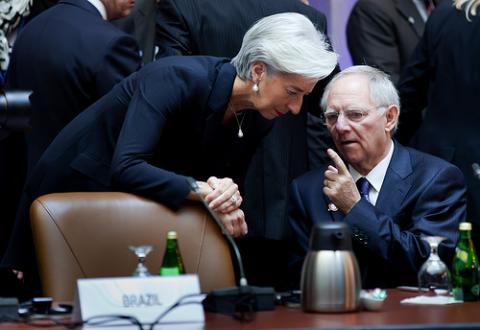Austerity is not the cure for the Eurozone

The policies advocated by Germany's finance minister Wolfgang Schäuble as a cure for the crisis in the Eurozone should give us pause. Be afraid, be very afraid, writes Aidan Regan.
Today’s Financial Times carries a deeply worrying piece by German finance minister Wolfgang Schäuble on the causes of the crisis in the Eurozone, and potential cures. Schäuble is the most important politician in Europe. His ideas and political preferences will condition the evolution of Europe over the next couple of years (where most crucial decisions affecting generations will be taken). The only thing to say is: be afraid, be very afraid.
The core argument - which is completely untrue given the empirical data - is that “excessive state spending has led to unsustainable levels of debt that threaten economic welfare.” The only solution, according to Schäuble, is more and more austerity.
Michael Burke has gathered some very basic data that debunks the myth of excessive government spending: “Euro area government consumption rose annually by 1.7% in real terms between 1992 and 2006, i.e. before the recession began for all countries. Real GDP rose by 2.0%. In effect, government spending declined relative to GDP (Eurostat data). Gross general government debt was 69% of GDP in 2003 and 69.9% in 2008."
Where then is the “excessive state spending” that has led to unsustainable debt and deficits?
The notion that excessive state spending has led to unsustainable levels of debt and deficits is so far off the mark when it comes to Ireland, one wonders whether Irish politicians/central bankers/civil servants are being ignored in Europe, remaining silent, or just buying into this consensus. Ireland’s problem began with the reckless behaviour of private actors in private markets. The socialisation of bad debt by the taxpayer has saved Wolfgang Schäuble’s political career. It means he does not have to go to the German electorate and ask them to pay the bad debts of Deutsche bank. Thus, he should be thanking the Irish taxpayer.
Schäuble is taking the Greek case and applying it to all 17 member states of the Europena Monetary Union (EMU). The problem in Greece is fiscal and definitively related to state borrowing. This is not the case for Ireland, Spain, Portugal and Italy. The domestic policy choice that has Ireland in a mess (in addition to the perverse incentives created by the exogenous factor of joining the EMU) is a reckless low tax regime based on pro-cyclical taxes. This low marginal tax regime, along with minimal regulation in finance and labour markets has been shown to be deeply problematic, but it is central to the policies Schäuble encourages Germany to adopt.
The article implicitly assumes and advocates that all member states should adopt the German political economy. This is both totally ridiculous and logically impossible (someone has to buy those BMWs). The fiscal, welfare and industrial relations policies and institutional configuration of the 17 countries in the Eurozone will not converge on the German model.
Austerity is not the cure for the Eurozone. It is the cure for the German Christian Democratic electoral manifesto when they seek re-election in 2013.
Image top: International Monetary Fund.
Aidan Regan is a PhD candidate in Public Policy at University College Dublin.
